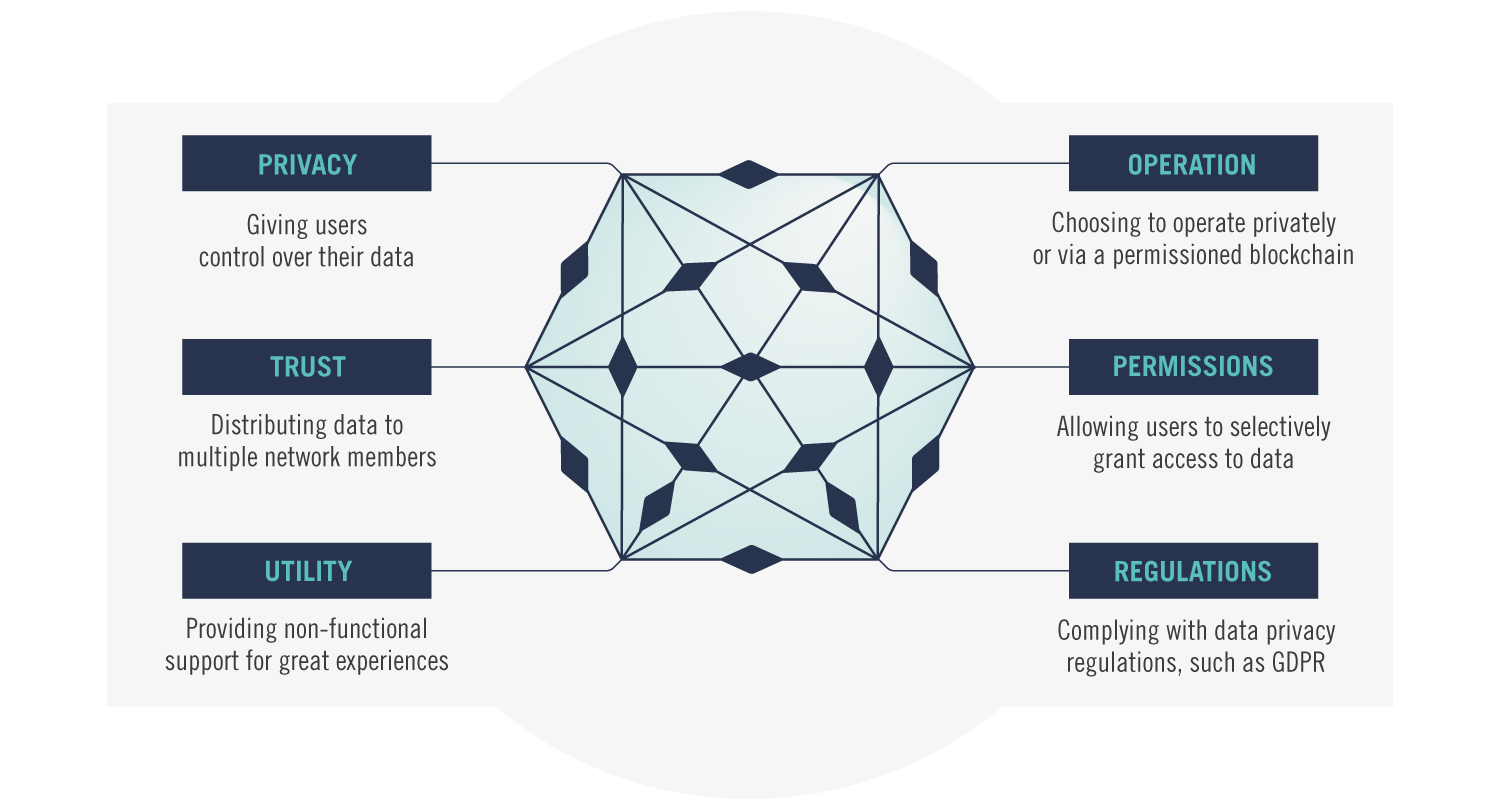One of the world’s most significant commercial contracts is up for renegotiation. Time is running down on the tacit agreement that we will happily trade our personal data for digital services. This seismic shift is happening in plain sight, with many of the huge societal implications going unnoticed. But as well-informed observers realise, substantial early-mover advantage exists for businesses offering experiences that let users stay in control of their data. I believe that decentralised platforms are the way to seal that new deal.
In this article, I’m going to examine the emerging distributed ledger technologies underpinning the decentralised platforms that are maturing in time to form a coexistence strategy with current approaches. I’ll explore the challenges and weaknesses as well as the possibilities, expose the trade-offs, and advocate a balanced, semi-decentralised approach – which I think will power the new wave of breakthrough smart digital platforms.
When it comes to decentralised platforms, a key underlying question will remain a debating point. How to generate value from digital experiences if data is no longer part of the contract. Perhaps you’re a brand manager plotting a product+ service, rich in personalisation. A C-suite strategist or government policy maker. Or an artist, musician or designer creating digitised assets. In all cases, it will be vital to solve the issue of how to be rewarded for the service experience you provide.
More on that later, but let’s begin with the changing user landscape. There is a heightened awareness of the leakage and exploitation of personal data. The deal has been clear hitherto. Users enjoy utility, social messaging perhaps, in exchange for access to their data. But there is a growing appreciation of the value inherent in the data and that the deal is not equitable.
Consumers feel strongly about it in the same way as they do about the environment or ethical work practices. This disquiet is also generational, with millennials and younger having a greater intolerance of the model. We certainly shouldn’t expect Gen Z to stand for it for much longer. If we are to move to the next level of digital services evolution, we must find a more equitable approach to data control.
Decentralised platform models
Decentralised platform models allow the user to maintain the rights to their data via a permission management protocol or a digital wallet to gate access. They offer, in other words, a way to bring greater balance and harmony to digital services.
Current worries with the existing model are exacerbated as smart experiences penetrate more deeply into our lives and homes. As our data footprint increases, our anxiety deepens. Here’s an example. A remote family carer might embrace the usefulness of a connected camera to help in the assisted living of an elderly relative, but blanch at the prospect of surveillance data being made available to a third party.
Users are increasingly feeling deprived of access. Data is being controlled by service providers while the users themselves are locked out. Exercise and health data, for instance, is locked into the service provider’s database and is not viewable in real time outside its applications. But people want portability of their data so that they can apply it to more applications of their choosing.
And how about the behavioural targeting used in preference advertising and marketing? Some call it spooky, some find it inappropriate, and some are thrilled by the ability of providers and advertisers to provide recommendations based on search data. But my view is this – the suggestions are only ever approximately correct.
They represent analysis of implied interest based on historic activity, not what I want right now. Just because I check out DIY power tools at breakfast doesn’t mean I want to be served nail gun ads while I’m creating digital services concepts later in the day. Actually, there is a better way – providing my own precise preferences via a decentralised platform.
There is of course vast vested interest in the status quo. To date, a small number of dominant providers –Facebook, Google, Uber and the rest – have flourished by basing services on their massive global databases. This is the established pattern of providing the platform that sits between the customer’s request and the service or resource that satisfies it.
The network effect then drives incredible growth, as in the Amazon world where consumers attract more providers which in turn attract more consumers. The service collects data which can be used to improve the service and monetise to third parties – think recommendations.
Okay, let’s bite the bullet on this. How do we change the data ownership model to a concept that’s outside the mainstream and that many business processes and platforms aren’t necessarily geared up for? Actually, the sands are already shifting.
Distributed ledger technologies
This year we’ve seen a heightened interest in decentralised platforms. They are commonly defined as peer-to-peer networks, typically using distributed ledger technologies. Instead of single large databases of amalgamated user data, everyone has a copy of the distributed data. Advanced cryptography locks in trust, and when a transaction is made it is recorded forever.
In recent months, we’ve witnessed a surge in the value of crypto currencies, with the likes of business analytics giant MicroStrategy investing in Bitcoin. China, meanwhile, is launching its own ambitious blockchain service network.
The advance of decentralised technologies, sparking new approaches and more sophisticated platforms, is offering a real alternative for societal models in sovereignty, user data and digital asset ownership. Why is it all suddenly viable? Forces such as economies of scale and the longevity and scalability of Bitcoin and other currencies are aligning just as the technology matures.
There’s no doubt in my mind that a decentralised platform strategy could offer an approach that is more compatible with users’ desire to retain control of their data and its value. But for a functioning economy and marketplace we need entrepreneurial companies to able to enjoy just rewards for their innovation and investment.
This brings me back to the big question I raised earlier. Providers won’t be able to monetise data like they did before. Their precise ‘reward’ might be revenue, market share, brand value… perhaps a possible solution is to get the user to pay for the control of data. Or maybe the prize is a clearer route to market, with innovative ideas to attract and retain customers. The debate around all the options is worthy of discussion, I think.
Encryption to ensure user control
Now let’s unpack decentralised platforms in a little more detail. Yes users retain ownership of their data, but security of encryption keys is a weighty challenge. Options such as the Ocean Protocol for buying and selling data securely as well as portable data banks like Solid from world wide web inventor Tim Berners-Lee have emerged. The role there is to encrypt data and controlling access via public/private keypairs, ensuring that the user retains control.
This means that the service provider does not have carte blanche to analyse or monetise the user data without the user’s permission. Indeed, the mechanisms of the user staying in control by the cryptographically secured private key means they can grant or revoke access to the service provider or give access to a new service provider and support data portability.
Decentralised networks also lower the barriers of entry for new providers to enter into the digital service economy. In this space, service providers are judged more on the user experience they provide rather than having to amass large consumer bases. For the user, it’s easier to authenticate into the network. Crypto security can unlock digital services to the huge populations which are currently undocumented. Many populations currently cannot access digital services since they don’t have the means to provide identity (passport, identity, registered home address, for example).
I foresee much more advanced distributed ledger technologies playing an active role in the market, which have matured over recent years to the point where they are now viable for industry-wide decentralised systems.
Challenges lie ahead
As the premise of distributed ledger technologies is that encrypted transaction data is shared with all participants and is immutable, there are implications to consider around data privacy. Again, this is an area where debate will run and run. That said, progress is happening and there are various distributed ledger technologies to choose from which can help adhere to these regulations. More recent ones are even providing the ability to adhere to European GDPR regulations around the ‘right to be forgotten’.
There are also challenges with storing large amounts of data on distributed ledger technologies, as well as the environmental impact of the required processing power from recording the transactions. The duplication of effort taken at every node is not consistent with the storage of large amounts of data or high transaction rates. Overall, there are tensions to be resolved in determining the right form of platform for delivering digital services. Figure 1 captures some of these strains and tensions.

Figure 1. The competing tensions of decentralized systems
Semi-decentralisation is the way forward
With these challenges in mind, I think it’s highly likely that smart digital systems of the future will manage data within a semi-decentralised approach. Distributed ledger technologies, like Solid, can provide a highly compelling decentralised model to store encrypted personal data, record transactions and allow users to strictly manage permissions. This will all be managing relatively small amounts of data. To complement this, centralised systems can be used to manage the large amounts of data needed for support service functions, such as content or push notifications. You can encrypt this data and link to a hash of it to keep a record in the distributed ledger technology.
A digital service provider looking to offer user privacy as part of their offer should consider a decentralised platform approach. They could host and run this themselves or run this from an existing platform such as Ethereum. Crucially, in both cases the process is the same – the user chooses what data they share and with who. They are in complete control.
To conclude, let me sum it up like this. It doesn’t really matter when you first get to hear great music. The first time you hear it you know it’s right – never mind if that’s Led Zeppelin in the 1970s or the 2020s. That’s how I feel about the promise of decentralisation for digital services. A maturing technology landscape can now support a variety of data ownership models, meaning we are no longer constrained to the restrictive strategies that we have become accustomed to, but which are under threat from changing consumer requirements. The time is right, so let’s rock.
A final word… if you want to transform your physical product business through digital, or you’re an existing service provider looking to deliver a radical experience to accelerate growth in a new market – but you want to disrupt by having respect for your users’ data – maybe we should talk.





